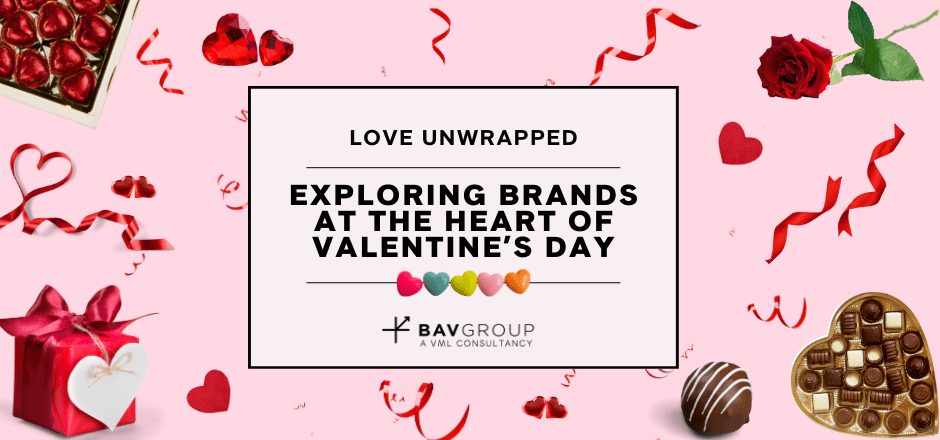Love Unwrapped
02.13.2024

Let’s explore the marketplace of love
Valentine’s Day , often dubbed a “Hallmark holiday” by cynics, may be dismissed by many as overly commercialized. Gimmicks aside, there is something to be admired about the brands that have come to define the ways we express our love and affection.
Let’s explore some of the brands that have become so entwined with Valentine’s Day in our culture that they have become indelible symbols of romance, through the lens of the syndicated data from Brand Asset Valuator® (aka BAV®).

Godiva and the Language of Indulgence
In 1824, Cadbury began selling the first-ever heart-shaped boxes of chocolate, solidifying chocolate as a staple in Valentine’s Day culture. And while BAV data shows that Cadbury is known for being charming and fun, it’s really Godiva that’s captured the essence of sensuous and distinctive that is so intertwined with romance. Its elegant packaging, focus on artistry and craftsmanship, and emphasis on the tactile experience of chocolate have helped transform chocolate from a simple pleasure to a luxurious, romantic indulgence.

Hallmark and the Envelope of Emotional Expression
For hundreds of years Valentine’s Day cards were handmade. It wasn’t until the Industrial Revolution in the 19th century that they could be mass produced. Once Hallmark began releasing mass-produced Valentine’s Day cards in the early 1900’s, the Hallmark brand became the cornerstone of Valentine’s Day that it is today. BAV data shows Hallmark is seen as traditional, creative, kind and friendly. And while the Hallmark brand is showing signs of fatigue, it still manages to be the strongest brand in its competitive set.

1800 Flowers and its Blooms of Affection
Red roses have long been associated with love, which may may be inspired by the mythology Venus, Roman goddess of love, reinforced by practices of chivalry in the Middle Ages, and solidified by Victorian era floriography -- the language of flowers. Today floral retail is split between large national players and smaller boutique brands. 1800flowers, among the largest, has a persona that is traditional and established and it seems to be doubling down on perceptions of quality, heritage, and joy through partnerships with brands like Disney and Harry & David. On the other hand, a more recent entrant to the category like Urban Stems, has a more modern and trendy feel.

Tiffany & Co. and its Enduring Luxury
It was the invention of the metal press in 1840 that allowed jewelry to be mass produced, and by the 1920s realistic imitations of expensive jewelry was made acceptable by fashion designers. But it was Tiffany & Co., with its iconic blue box, that transformed the act of giving jewelry into a cherished Valentine’s Day tradition. In the BAV syndicated study, Tiffany & Co. is best known for being glamorous and prestigious, balanced with a charming and authentic side. However, the Tiffany brand has lost ground over the past decade, with Pandora emerging as a leadership brand in culture.

While many of us roll our eyes at the over-commercialized nature of Valentine’s Day, the fact that these brands have shaped the way we express and experience the most profound emotion is impressive. As we head into this Valentine’s season, think about what the brands you’re buying for your loved ones says about you and the kind of love you value.

Want to learn more about your brand in culture?
Contact us to schedule a 30 minute complimentary consultation.
Author: Jenna Rounds, Managing Director
With over 15 years in advertising, Jenna has crafted meaningful brand strategies, architected unique multi-channel campaigns and explored innovative new ways of bringing ideas to life. She has led planning for some of the world’s most renowned brands, including Proctor and Gamble, Dell, Campbell’s, Pfizer and Gillette. She’s adept at finding the intersection between the brand’s strategic goals and the audiences’ specific needs. She has a passion for understanding human behavior and is a strong believer in the power of brands.She has an MBA from NYU Stern School of Business and a BS from Lehigh University. She lives on Long Island with her husband and two children.
Connect with Jenna on LinkedIn.
